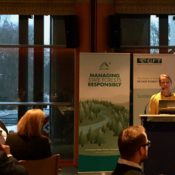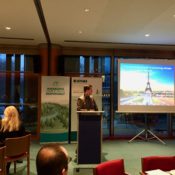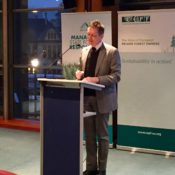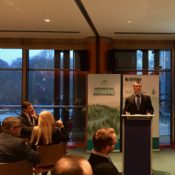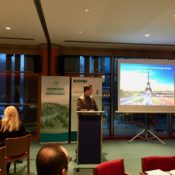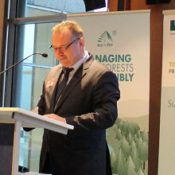Forest Management is solution to Climate Change
EUSTAFOR & CEPF JOINT PRESS RELEASE
Forest owners and managers illustrate to policy makers and stakeholders ways in which European forests can contribute to decarbonizing our society
Baltic and Balkan foresters showcased how Sustainable Forest Management is an activity which enables climate change mitigation and adaptation. They spoke at the event “Forests & Climate: The Impact of Forests and Forestry on the EU Climate and Energy Policy” hosted by MEP Elisabeth Köstinger on 24 January 2017 at the EU Parliament.
MEP Elisabeth Köstinger opened the meeting by highlighting the importance of “not only focusing on afforestation but also recognizing and promoting the contribution of active forest management and wood products as carbon sinks.” A keynote speech was given by Artur Runge-Metzger, Director at the European Commission DG Climate Action, addressing some of the most commonly raised questions regarding the Commission’s proposal on land use and forests in the post-2020 climate polic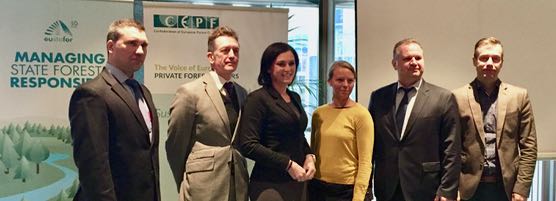 y.
y.
Prof. Gert-Jan Nabuurs (Wageningen University) delivered insights into the role of forests in mitigating climate change and presented how forest management can make additional contributions in terms of long-term decarbonization. Aigar Kallas, CEO of the Estonian State Forest Enterprise (RMK) and a member of the European State Forest Association (EUSTAFOR), provided concrete figures on how State Forest Management Organizations achieve multifunctionality and sustainability in forest management. He emphasized that “forest management is based on long-term perspectives and the growing cycle of forests exceeds the timeline of climate policy.” Zdenko Bogovic, President of the Croatian Union of Private Forest Owners’ Associations, a member of the Confederation of European Forest Owners (CEPF), highlighted the possibility of further developing the Croatian forest sector to benefit both climate and society. He reminded the audience that, as they are responsible for implementing actions on the ground, Europe’s 16 million private forest owners are key partners in developing EU climate and energy policy. Among the speakers, Sini Eräjää (BirdLife Europe) gave a statement focusing on the role of forests as carbon sinks and carbon stocks.
The event provided a great opportunity to explore how the contribution of managed forests and wood products towards climate change mitigation should be reflected in the overall EU policy framework and specifically in the context of the ongoing work on the LULUCF (Land Use, Land Use Change, and Forestry) and ESR (Effort Sharing Regulation) proposals.
Both EUSTAFOR and CEPF advocate for a strong role for forestry in the EU Climate and Energy Policy framework. “It is imperative that Member States are encouraged to support sustainable forest management and the increased use of wood-based products, including biomass for energy, to replace fossil-based materials. LULUCF accounting rules should not hinder this. They should instead better acknowledge the long-term perspective of forestry and the fact that, when harvesting does not exceed forest growth, forests remain a net biological carbon sink,” says Emma Berglund, Secretary General of CEPF. Read more in CEPF’s Position Paper on LULUCF. Piotr Borkowski, Executive Director of EUSTAFOR, underlines that “the EU climate policy should take into full account the diversity of European forests across the EU and the consequent diversity of Member State approaches to Sustainable Forest Management”. EUSTAFOR’s Position Paper on Climate Change Policy explains that Sustainable Forest Management, in connection with the widespread use of timber products, can offer a means to counteract climate change and to make the transition towards low-carbon bio-based societies and economies.
Published 25/01/2017
Mr. Piotr Borkowski
Executive Director
- piotr.borkowski@eustafor.eu
- +32 (0) 474 989 319




